Chapter 4 Chapter4 英汉对比与翻译(二)
- 格式:doc
- 大小:55.50 KB
- 文档页数:4
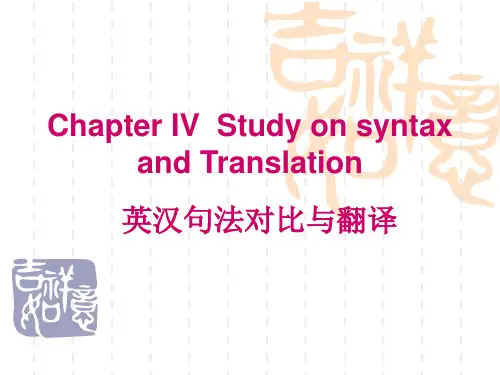
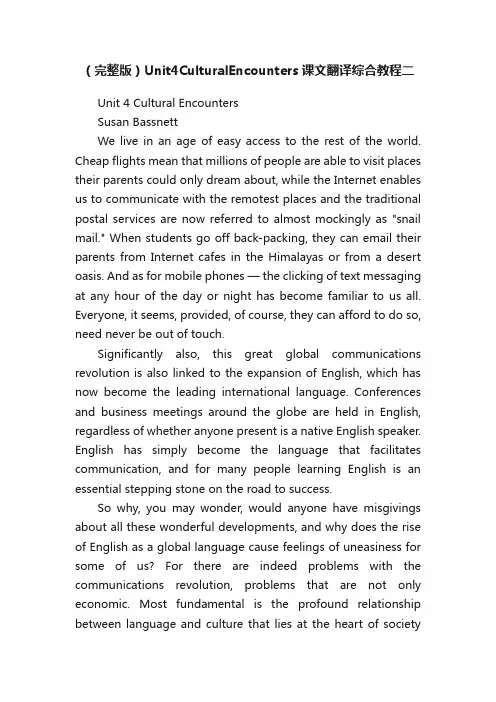
(完整版)Unit4CulturalEncounters课文翻译综合教程二Unit 4 Cultural EncountersSusan BassnettWe live in an age of easy access to the rest of the world. Cheap flights mean that millions of people are able to visit places their parents could only dream about, while the Internet enables us to communicate with the remotest places and the traditional postal services are now referred to almost mockingly as "snail mail." When students go off back-packing, they can email their parents from Internet cafes in the Himalayas or from a desert oasis. And as for mobile phones — the clicking of text messaging at any hour of the day or night has become familiar to us all. Everyone, it seems, provided, of course, they can afford to do so, need never be out of touch.Significantly also, this great global communications revolution is also linked to the expansion of English, which has now become the leading international language. Conferences and business meetings around the globe are held in English, regardless of whether anyone present is a native English speaker. English has simply become the language that facilitates communication, and for many people learning English is an essential stepping stone on the road to success.So why, you may wonder, would anyone have misgivings about all these wonderful developments, and why does the rise of English as a global language cause feelings of uneasiness for some of us? For there are indeed problems with the communications revolution, problems that are not only economic. Most fundamental is the profound relationship between language and culture that lies at the heart of societyand one that we overlook at our peril.Different cultures are not simply groups of people who label the world differently; languages give us the means to shape our views of the world and languages are different from one another. We express what we see and feel through language, and because languages are so clearly culture-related, often we find that what we can say in one language cannot be expressed at all in another. The English word "homesickness" translates into Italian as "nostalgia," but English has had to borrow that same word to describe a different state of mind, something that is not quite homesickness and involves a kind of longing. Homesickness and nostalgia put together are almost, but not quite, the Portuguese "saudade," an untranslatable word that describes a state of mind that is not despair, angst (English borrowed that from German), sadness or regret, but hovers somewhere in and around all those words.The early Bible translators hit the problem of untranslatability head-on. How do you translate the image of the Lamb of God for a culture in which sheep do not exist? What exactly was the fruit that Eve picked in the Garden of Eden? What was the creature that swallowed Jonah, given that whales are not given to swimming in warm, southern seas? Faced with unsurmountable linguistic problems, translators negotiated the boundaries between languages and came up with a compromise.Compromising is something that speakers of more than one language understand. When there are no words in another language for what you want to say, you make adjustments and try to approximate. English and Welsh speakers make adjustments regarding the colour spectrum in the grey / green / blue / brown range, since English has four words and Welsh hasthree. And even where words do exist, compromises still need to be made. The word "democracy" means completely different things in different contexts, and even a word like "bread" which refers to a staple food item made of flour means totally different things to different people. The flat breads of Central Asia are a long way away from Mother's Pride white sliced toasties, yet the word "bread" has to serve for both.Inevitably, the spread of English means that millions of people are adding another language to their own and are learning how to negotiate cultural and linguistic differences. This is an essential skill in today's hybrid world, particularly now when the need for international understanding has rarely been so important. But even as more people become multilingual, so native English speakers are losing out, for they are becoming ever more monolingual, and hence increasingly unaware of the differences between cultures that languages reveal. Communicating in another language involves not only linguistic skills, but the ability to think differently, to enter into another culture's mentality and shape language accordingly. Millions of people are discovering how to bridge cultures, while the English-speaking world becomes ever more complacent and cuts down on foreign language learning programmes in the mistaken belief that it is enough to know English.World peace in the future depends on intercultural understanding. Those best placed to help that process may not be the ones with the latest technology and state of the art mobile phones, but those with the skills to understand what lies in, under and beyond the words spoken in many different languages.文化冲突我们生活在一个交流非常便捷的时代。
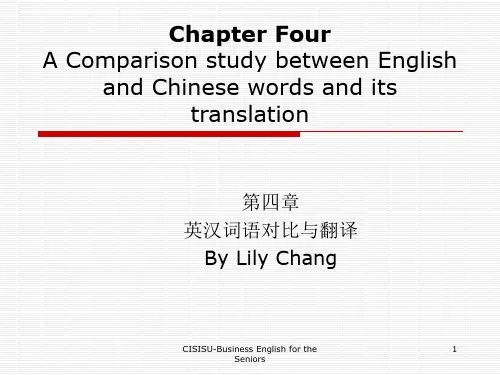
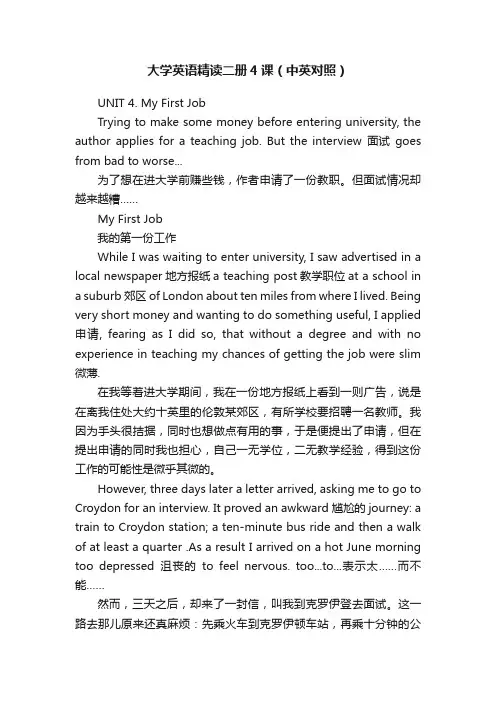
大学英语精读二册4课(中英对照)UNIT 4. My First JobTrying to make some money before entering university, the author applies for a teaching job. But the interview面试goes from bad to worse...为了想在进大学前赚些钱,作者申请了一份教职。
但面试情况却越来越糟……My First Job我的第一份工作While I was waiting to enter university, I saw advertised in a local newspaper地方报纸a teaching post教学职位at a school in a suburb郊区of London about ten miles from where I lived. Being very short money and wanting to do something useful, I applied 申请, fearing as I did so, that without a degree and with no experience in teaching my chances of getting the job were slim 微薄.在我等着进大学期间,我在一份地方报纸上看到一则广告,说是在离我住处大约十英里的伦敦某郊区,有所学校要招聘一名教师。
我因为手头很拮据,同时也想做点有用的事,于是便提出了申请,但在提出申请的同时我也担心,自己一无学位,二无教学经验,得到这份工作的可能性是微乎其微的。
However, three days later a letter arrived, asking me to go to Croydon for an interview. It proved an awkward 尴尬的journey: a train to Croydon station; a ten-minute bus ride and then a walk of at least a quarter .As a result I arrived on a hot June morning too depressed沮丧的to feel nervous. too...to...表示太……而不能……然而,三天之后,却来了一封信,叫我到克罗伊登去面试。
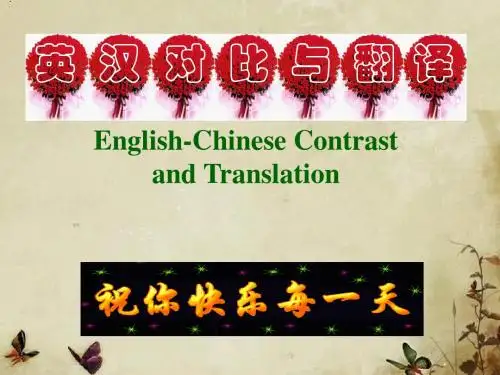
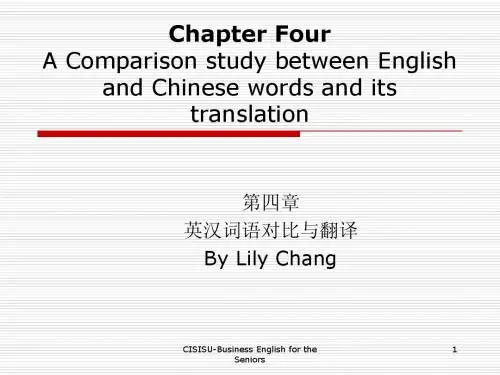
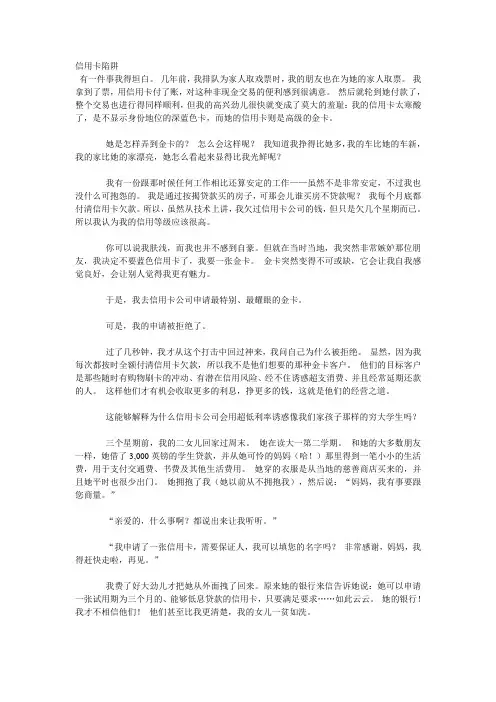
信用卡陷阱有一件事我得坦白。
几年前,我排队为家人取戏票时,我的朋友也在为她的家人取票。
我拿到了票,用信用卡付了账,对这种非现金交易的便利感到很满意。
然后就轮到她付款了,整个交易也进行得同样顺利,但我的高兴劲儿很快就变成了莫大的羞耻:我的信用卡太寒酸了,是不显示身份地位的深蓝色卡,而她的信用卡则是高级的金卡。
她是怎样弄到金卡的?怎么会这样呢?我知道我挣得比她多,我的车比她的车新,我的家比她的家漂亮,她怎么看起来显得比我光鲜呢?我有一份跟那时候任何工作相比还算安定的工作——虽然不是非常安定,不过我也没什么可抱怨的。
我是通过按揭贷款买的房子,可那会儿谁买房不贷款呢?我每个月底都付清信用卡欠款。
所以,虽然从技术上讲,我欠过信用卡公司的钱,但只是欠几个星期而已。
所以我认为我的信用等级应该很高。
你可以说我肤浅,而我也并不感到自豪。
但就在当时当地,我突然非常嫉妒那位朋友,我决定不要蓝色信用卡了,我要一张金卡。
金卡突然变得不可或缺,它会让我自我感觉良好,会让别人觉得我更有魅力。
于是,我去信用卡公司申请最特别、最耀眼的金卡。
可是,我的申请被拒绝了。
过了几秒钟,我才从这个打击中回过神来,我问自己为什么被拒绝。
显然,因为我每次都按时全额付清信用卡欠款,所以我不是他们想要的那种金卡客户。
他们的目标客户是那些随时有购物刷卡的冲动、有潜在信用风险、经不住诱惑超支消费、并且经常延期还款的人。
这样他们才有机会收取更多的利息,挣更多的钱,这就是他们的经营之道。
这能够解释为什么信用卡公司会用超低利率诱惑像我们家孩子那样的穷大学生吗?三个星期前,我的二女儿回家过周末。
她在读大一第二学期。
和她的大多数朋友一样,她借了3,000英镑的学生贷款,并从她可怜的妈妈(哈!)那里得到一笔小小的生活费,用于支付交通费、书费及其他生活费用。
她穿的衣服是从当地的慈善商店买来的,并且她平时也很少出门。
她拥抱了我(她以前从不拥抱我),然后说:“妈妈,我有事要跟您商量。
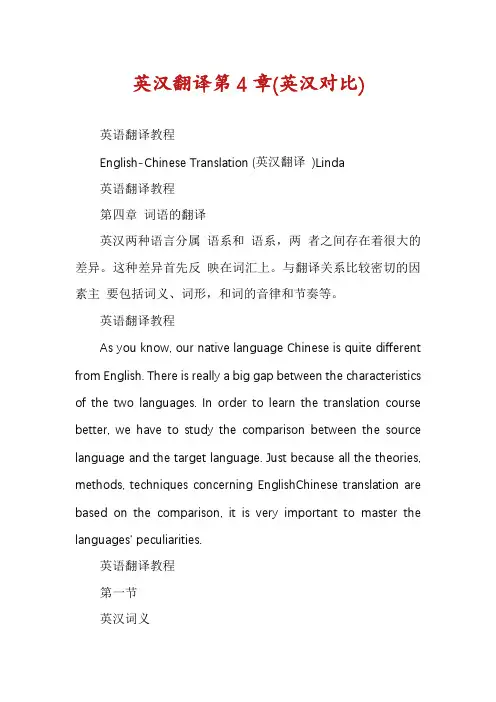
英汉翻译第4章(英汉对比)英语翻译教程English-Chinese Translation (英汉翻译)Linda英语翻译教程第四章词语的翻译英汉两种语言分属语系和语系,两者之间存在着很大的差异。
这种差异首先反映在词汇上。
与翻译关系比较密切的因素主要包括词义、词形,和词的音律和节奏等。
英语翻译教程As you know, our native language Chinese is quite different from English. There is really a big gap between the characteristics of the two languages. In order to learn the translation course better, we have to study the comparison between the source language and the target language. Just because all the theories, methods, techniques concerning EnglishChinese translation are based on the comparison, it is very important to master the languages’ peculiarities.英语翻译教程第一节英汉词义英汉词汇之间本身有着很大的差别,这种差别首先表现在词义上。
英国语言学家杰弗里 . 利奇在他的Semantics ( 语义学) 中把最广义的意义划分为7 种不同的类型:外延意义(概念意义)( denotative meaning )、内涵意义( connotative meaning )、风格意义( stylistic meaning )、情感意义( affective meaning )、联想意义( reflective meaning ) 搭配意义( collocative meaning )、主题意义( thematic meaning )。
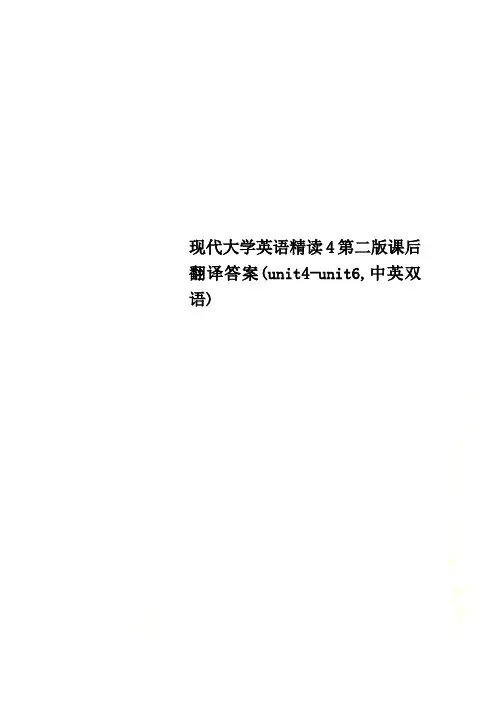
现代大学英语精读4第二版课后翻译答案(unit4-unit6,中英双语)Unit41.我看见一叶扁舟顺河漂流。
我不想像这小舟一样没有目标,随波逐流地了此一生。
I saw a boat drifting along the river. I do not intend to be like this boat, drifting through life aimlessly.2.山谷里的桃花全都盛开了,让她留恋忘返。
在前面不远处,她看见一家农舍,从窗户内传来了美妙的乡村音乐。
The peach trees in the valley were in full blossom, making it difficult to tear herself away from them. Some distance apart from her, she saw a little hut with sweet country music drifting out of its window.3.结婚以后,我和朋友的来往慢慢变少了。
而我夹在那些一起共事的商界人士当中十分不自在。
他们说的生意经我厌烦透了。
After my marriage, my friends and I drifted apart a little, and I was completely out of my element among those business people I had to work with. Their business discussions bored me stiff .4.他们之间已经具有发生内战的所有要素。
国际社会已向双方呼吁,希望他们和平解决争端。
They already had all the necessary elements for a civil war. The international community has appealed to both sides for a peaceful settlement of their disputes.5.很多人认为教会正在失去他的吸引力。
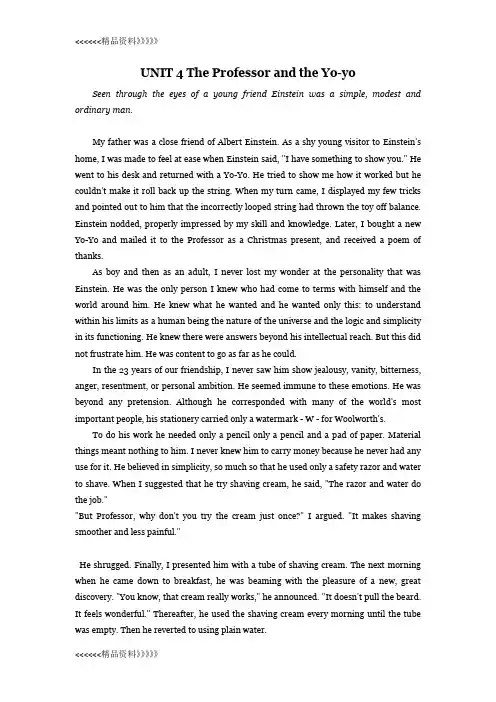
UNIT 4 The Professor and the Yo-yo Seen through the eyes of a young friend Einstein was a simple, modest and ordinary man.My father was a close friend of Albert Einstein. As a shy young visitor to Einstein's home, I was made to feel at ease when Einstein said, "I have something to show you." He went to his desk and returned with a Yo-Yo. He tried to show me how it worked but he couldn't make it roll back up the string. When my turn came, I displayed my few tricks and pointed out to him that the incorrectly looped string had thrown the toy off balance. Einstein nodded, properly impressed by my skill and knowledge. Later, I bought a new Yo-Yo and mailed it to the Professor as a Christmas present, and received a poem of thanks.As boy and then as an adult, I never lost my wonder at the personality that was Einstein. He was the only person I knew who had come to terms with himself and the world around him. He knew what he wanted and he wanted only this: to understand within his limits as a human being the nature of the universe and the logic and simplicity in its functioning. He knew there were answers beyond his intellectual reach. But this did not frustrate him. He was content to go as far as he could.In the 23 years of our friendship, I never saw him show jealousy, vanity, bitterness, anger, resentment, or personal ambition. He seemed immune to these emotions. He was beyond any pretension. Although he corresponded with many of the world's most important people, his stationery carried only a watermark - W - for Woolworth's.To do his work he needed only a pencil only a pencil and a pad of paper. Material things meant nothing to him. I never knew him to carry money because he never had any use for it. He believed in simplicity, so much so that he used only a safety razor and water to shave. When I suggested that he try shaving cream, he said, "The razor and water do the job.""But Professor, why don't you try the cream just once?" I argued. "It makes shaving smoother and less painful."He shrugged. Finally, I presented him with a tube of shaving cream. The next morning when he came down to breakfast, he was beaming with the pleasure of a new, great discovery. "You know, that cream really works," he announced. "It doesn't pull the beard. It feels wonderful." Thereafter, he used the shaving cream every morning until the tube was empty. Then he reverted to using plain water.Einstein was purely and exclusively a theorist. He didn't have the slightest interest in the practical application of his ideas and theories. His E=mc2 is probably the most famous equation in history - yet Einstein wouldn't walk down the street to see a reactor create atomic energy. He won the Nobel Prize for his Photoelectric Theory, a series of equations that he considered relatively minor in importance, but he didn't have any curiosity in observing how his theory made TV possible.My brother once gave the Professor a toy, a bird that balanced on the edge of a bowl of water and repeatedly dunked its head in the water. Einstein watched it in delight, trying to deduce the operating principle. But be couldn't.The next morning he announced, "I had thought about that bird for a long time before I went to bed and it must work this way…" H e began a ling explanation. Then he stopped, realizing a flaw in his reasoning. "No, I guess that's not it," he said. He pursued various theories for several days until I suggested we take the toy apart to see how it did work. His quick expression of disapproval told me he did not agree with this practical approach. He never did work out the solution.Another puzzle that Einstein could never understand was his own fame. He had developed theories that were profound and capable of exciting relatively few scientists. Yet his name was a household word across the civilized world. "I've had good ideas, and so have other men," he once said. "But it's been my good fortune that my ideas have been accepted." He was bewildered by his fame: people wanted to meet him; strangers stared at him on the street; scientists, statesmen, students, and housewives wrote him letters. He never could understand why he received this attention, why he was singled out as something special.在一个年轻的朋友的眼里,爱因斯坦是一个朴素、谦虚而普通的人。
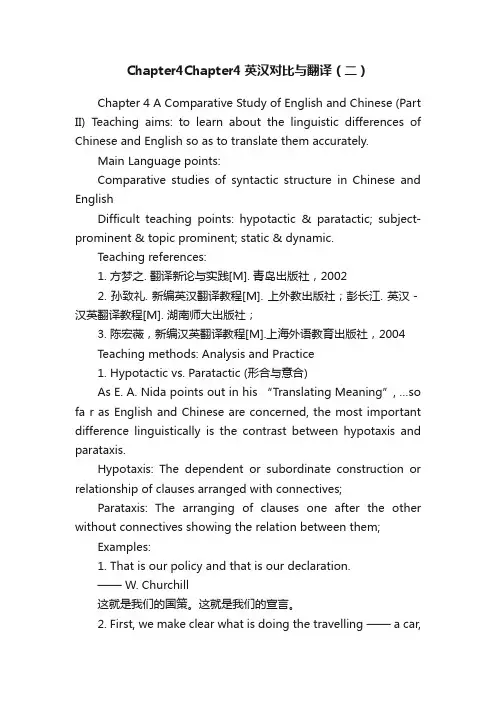
Chapter4Chapter4英汉对比与翻译(二)Chapter 4 A Comparative Study of English and Chinese (Part II) Teaching aims: to learn about the linguistic differences of Chinese and English so as to translate them accurately.Main Language points:Comparative studies of syntactic structure in Chinese and EnglishDifficult teaching points: hypotactic & paratactic; subject-prominent & topic prominent; static & dynamic.Teaching references:1. 方梦之. 翻译新论与实践[M]. 青岛出版社,20022. 孙致礼. 新编英汉翻译教程[M]. 上外教出版社;彭长江. 英汉-汉英翻译教程[M]. 湖南师大出版社;3. 陈宏薇,新编汉英翻译教程[M].上海外语教育出版社,2004Teaching methods: Analysis and Practice1. Hypotactic vs. Paratactic (形合与意合)As E. A. Nida points out in his “Translating Meaning”, …so fa r as English and Chinese are concerned, the most important difference linguistically is the contrast between hypotaxis and parataxis.Hypotaxis: The dependent or subordinate construction or relationship of clauses arranged with connectives;Parataxis: The arranging of clauses one after the other without connectives showing the relation between them;Examples:1. That is our policy and that is our declaration.—— W. Churchill这就是我们的国策。
Unit 4 Meeting the MuseUnderstanding ideasWhat inspires you?Every artist’s wish is to create something that expresses an idea. But where do artists get their ideas from? Who or what inspires them? Here we find out more about the influences behind the successes of three very different artists.express v. ____________ n. __________ influence__________inspire v. _____________ n. ___________ find out ___________段落翻译:________________________________________________________________________________ ________________________________________________________________________________ Florentijn Hofman, visual artist①Florentijn Hofman is a Dutch artist, whose large sculptures are on display all over the world. One way for him to find inspiration is turning to his children’s toys. These objects have given him ideas for his animal sculptures, such as the famous Rubber Duck. A more recent work of his is the huge Floating Fish, which was set among the beautiful landscape of Wuzhen West Scenic Zone.②Hofman’s inspiration for Floating Fish came from Chinese folk tales passed down through the generations. He was particularly interested in the old story about a fish jumping through the “Dragon Gate”. This story came to life for Hofman when he visited Wuzhen and saw how people lived there.③“During the walk and my stay here in the town, I saw the fish being fed by people. You see also some fish sculpted on the wall.” These sights set Hofman’s idea for Floating Fish in motion. visual___________ turn to___________on display____________________ inspiration ___________folk tales___________ in motion___________pass…down through generations ____________________ float___________being fed by people 在句子中作___________成分,修饰____________sculpted on the wall在句子中作___________成分,修饰____________________________________________________________________________________________ ________________________________________________________________________________ ________________________________________________________________________________ ________________________________________________________________________________ ________________________________________________________________________________ ________________________________________________________________________________ ________________________________________________________________________________ ________________________________________________________________________________ _______________________________________________________________________________ Tan Dun, poser④“There is no territory in the world of music.” These are the words of Chinese poser Tan Dun. He is most widely known for posing music for the film Crouching Tiger, Hidden Dragon and the 2008 Beijing Olympics.⑤To listen to Tan’s music is to experience a mix of Chinese musical traditions and Western influences. Since his first opera, Nine Songs, Tan Dun has been using a bination of Chinese music and sounds from all over the world to tell stories. As Tan once said, Chinese music should carry “universal expression” of the human spirit so as to be recognised by the whole world.territory n. __________ poser n. _____________ v. _____________be widely known for ___________________ a mix of _______________a bination of__________________ v. _______________so as to/in order to _________________ 表_______________________________________________________________________________________________ ________________________________________________________________________________ ________________________________________________________________________________ ________________________________________________________________________________ ________________________________________________________________________________ ________________________________________________________________________________________________________________________________________________________________________________________________________________________________________________ Yang Liping, dancer⑥Yang Liping’s passion is dancing. After winning a national petition in 1986 with her Spirit ofthe Peacock dance, she has been known as the “Peacock Princess”. The inspiration for her famousdances has e from the time she spent in Xishuangbanna, Yunnan Province.⑦“I feel very grateful for the years in Xishuangbanna,” says Yang. “It gave me a chance to godeeper into the lives of various ethnic groups... Our ethnic groups, especially the Dai people, admire the peacock. They think the peacock represents the beauty of nature. I especially like the dance style of the Dai people and it gives me lots of inspiration. My dance es from their traditional belief and aims to bring out the Dai women’s beauty.”passion ____________be known as ___________________ go deeper into ________________ethnic groups _____________________ princess ____________ 王子____________She spent in Xishuangbanna, Yunnan Province 是一个__________从句,引导词_________在从句中作___________,所以省略了be/feel grateful for sth.__________bring out the Dai women’s beauty_____________________________________________________________________________________________________ ____________________________________________________________________________________ ____________________________________________________________________________________ ____________________________________________________________________________________ ____________________________________________________________________________________ ____________________________________________________________________________________ ________________________________________________________________________________________________________________________________________________________________________ Developing ideasART & TECHNOLOGY①Think “art”. What es to your mind? Is it Greek or Roman sculptures in the Louvre, or Chinese paintingsin the Palace Museum? Or maybe, just maybe, it’s a dancing pattern of lights?②The artworks by American artist Janet Echelman look like colourful floating clouds when they are lit up at night. Visitors to one of her artworks in Vancouver could not only enjoy looking at it, they could also interact with it—literally. They did this by using their phones to change its colours and patterns. Exhibits such as these are certainly new and exciting, but are they really art?③Whatever your opinion, people have been expressing their thoughts and ideas through art for thousands of years. To do this, they have used a variety of tools and technologies. Yet Michelangelo and others have been labelled as “artists” rather than “technicians”. This means that art and technology have always been seen as two very separate things.e to your mind __________________ dancing pattern of lights_________________light up_________________interact with_________________ literally______________a variety of_________________ rather than_________________ separate______________exhibits ____________ be labelled as_________________ technician_________________________________________________________________________________________________ ________________________________________________________________________________ ________________________________________________________________________________ ________________________________________________________________________________ ________________________________________________________________________________ ________________________________________________________________________________ ________________________________________________________________________________ ________________________________________________________________________________ _______________________________________________________________________________ ④Today, however, technological advances have led to a bination of art and technology. As a result, the art world is changing greatly. Now art is more accessible to us than ever before. Take for example one of China’s most famous paintings from the Song Dynasty, Along the River During the Qingming Festival. As this artwork is rarely on display, people have sometimes queued up to six hours for a chance to see it. Once in front of the painting, they only have limited time to spend taking in its five metres of scenes along the Bian River in Bianjing. Thanks to technology however, millions more people have been able to experience a digital version of this painting. Threedimensional (3D) animation means that viewers can see the characters move around and interact with their surroundings. They can also watch as the different scenes change from daylight into nighttime.technological advances________________ lead to ________________is more accessible to ________________ surroundings________________queue______________ up to________________ take in____________________ threedimensional ___________________ animation______________________________________________________________________________________________ ________________________________________________________________________________ ________________________________________________________________________________ ________________________________________________________________________________ ________________________________________________________________________________ ________________________________________________________________________________ ________________________________________________________________________________ ________________________________________________________________________________ _______________________________________________________________________________ ⑤The arttech bination is also changing our concepts of “art” and the “artist”. Not only can we interact with art, but also take part in its creation. With new technological tools at our fingertips, more and more people are exploring their creative sides. The result has been exciting new art forms, such as digital paintings and videos.⑥However, the increase in the amount and variety of art produced has also raised questions over its overall quality. Can a video of someone slicing a tomato played in slow motion really be called “art”?⑦Similarly, such developments are making the line between art and technology less distinct. Can someone unfamiliar with traditional artists’ tools really call themselves an “artist”? And is the artist the creator of the art itself, or the maker of the technology behind it? A recent project used technology and data in the same way that Rembrandt used his paints and brushes. The end result, printed in 3D, was a new “Rembrandt painting” created 347 years after the artist’s death. These advances are perhaps bringing us closer to a time when puters rather than humans create art.⑧Where technology will take art next is anyone’s guess. But one thing is for sure—with so many artists exploring new possibilities, we can definitely expect the unexpected.the arttech bination____________________ concepts ______________at one’s fingertips ______________ raised questions over ______________overall quality______________ slice______________in slow motion ______________ distinct______________that Rembrandt used his paints and brushes 是____________从句,修饰_______________when puters rather than humans create art是____________从句,修饰_______________________________________________________________________________________________ ________________________________________________________________________________ ________________________________________________________________________________ ________________________________________________________________________________ ________________________________________________________________________________ ________________________________________________________________________________ ________________________________________________________________________________ ________________________________________________________________________________ ________________________________________________________________________________。
在生活中,没有什么比顿悟更令人激动和兴奋的,它可以改变一个人---------不仅仅是改变,而且变得更好。
当然,这种顿悟是很罕见的,但仍然可以发生在我们所有人身上。
它有时来自一本书,一个说教或一行诗歌,有时也来自一个朋友。
在曼哈顿一个寒冷的冬天下午,我坐在一个法国小餐馆,倍感失落和压抑。
因为几次误算,在我生命中一个至关重要的项目就这样落空了。
就因为这样,甚至连期望看到一个老朋友(我常常私下亲切的想到的一个老人)的情形都不像以前那样令我兴奋。
我坐在桌边,皱起眉头看着色彩多样的桌布,清醒地嚼着苦涩的食物。
他穿过街道,过着旧棉袄,一顶帽子从光头打下来,看上去不像是一个有名的精神病医生,倒像是一个精力充沛的侏儒。
他的办公室在附近到处都有,我知道他刚刚离开他最后一个病人。
他接近80岁,但仍然扛着一个装着满满文件的公文包,工作起来仍然像一个大公司的主管,无论何时有空,他都仍然爱去高尔夫球场。
当他走过来坐在我旁边时,服务员早已把他总是要喝的啤酒端了过来。
我已经几个月没有见他了,但他似乎还是老样子。
没有任何寒暄,他就问我“怎么了,年轻人?”我已经不再对他的样子感到奇怪,所以我详细地把烦恼告诉他。
带着一丝忧伤的自豪,我尽量说出实情,除了我自己,我并没有因为失望而责备任何人。
我分析了整件事情,但所有负面评价以及错误仍然继续。
我降了约有十分钟,这期间老人只是默默的喝着啤酒。
我讲完后,他取下眼镜说:“到我的办公室去。
”“到你的办公室?你忘了带什么了吗?”他和蔼的说“不是,我想看看你对某些事情的反应,仅此而已。
”外面开始下起小雨,但他的办公室很温暖,舒服,亲切:放满书的书架靠着墙壁,长皮沙发Sigmund佛洛依德的亲笔签名照,还有墙边放着的录音笔。
他的秘书已经回家了,只有我们在那里。
老人从纸盒里拿出一盘磁带放进录音笔,然后说:“这里面有到我这里来求助的三个人的简单录音,当然,这没有说明具体是那三个人。
我想让你听听,看你是否能找出双字词的短语,这里是在三个案例中共有的。
The following text is extracted from Marriages and Families by Nijole V.Benokraitis.下面的文章选自奈杰尔贝诺克瑞提斯的婚姻与家庭。
The book has been used as a textbook for sociology courses and women's studies in a number of universities in the United States.此书在美国的一些大学里被用作社会学和妇女研究等课程的教材,It highlights important contemporary changes in society and the family它强调了在当代社会和家庭中所发生的重要变化,and explores the choices that are available to family members,探索了家庭成员所面临的选择,as well as the constraints that many of us do not recognize.以及我们很多人都还未意识到的种种约束。
It examines the diversity of American families today,该书还审视了当今美国家庭的多样性,using cross-cultural and multicultural comparisons运用跨文化和多元文化的比较,to encourage creative thinking about the many critical issues that confront the family of the twenty-first century.以激发创造性思维来研究21世纪家庭所面临的许多严峻问题。
LOVE AND LOVING RELATIONSHIPS爱和情感连系Nijole V.Benokraitis奈杰尔·贝诺克瑞提斯Love — as both an emotion and a behavior — is essential for human survival.爱,对于人类的生存是不可或缺的。
Lesson 1 Finding fossil man 发现化石人We can read of things that happened 5,000 years ago in the Near East, where people first learned to write.我们从书籍中可读到5000 年前近东发生的事情,那里的人最早学会了写字。
But there are some parts of the world where even now people cannot write.但直到现在,世界上仍然有些地方,人们还不会书写。
The only way that they can preserve their history is to recount it as sagas -- legends handed down from one generation of storytellers to another.他们保存历史的唯一办法是将历史当作传说讲述,由讲述人一代接一代地将史实描述为传奇故事口传下来。
These legends are useful because they can tell us something about migrations of people who lived long ago,这些传说是很有用的,因为他们能告诉我们以往人们迁居的情况。
but none could write down what they did.但是没有人能把他们当时做的事情记载下来。
Anthropologists wondered where the remote ancestors of the Polynesian peoples now living in the Pacific Islands came from. 人类学家过去不清楚如今生活在太平洋诸岛上的玻利尼西亚人的祖先来自何方,The sagas of these people explain that some of them came fromIndonesia about 2,000 years ago.当地人的传说却告诉了人们:其中有一部分是在约2000年前从印度尼西亚迁来的。
英汉语言对比与翻译讲义(二)一、常见的被动式习语译法[1] It is said that 据说,有人说[2] It will be said that 有人会说[3] It is well-known that 大家都知道,众所周知[4] It is believed that 人们相信,大家相信[5] It is reported that 据报导,据报告,据通报[6] It is learned that 据闻,据说,已经查明[7] It is found that 据发现,人们认为[8] It has been found that 已经发现[9] It is considered that 据估计,人们认为[10] It is usually considered that 通常认为[11] It is thought that 有人认为[12] It is universally accepted that 普遍认为,是普遍接受的[13] It is taken that 人们认为,有人以为[14] It is regarded that 人们认为[15] It is generally agreed that 人们通常认为[16] It is generally recognized that 通常大家都承认[17] It is noticed that 人们注意到,有人指出[18] It is noted that 前面已经指出[19] It is announced that 据称,有人宣称[20] It is sometimes asked that 人们有时会说[21] It will be seen that 可见,可以看出[22] It will be seen from this (that) 由此可见[23] It should be pointed out that 必须指出[24] It must be admitted that必须承认,老实说[25] It is supposed that 据推测,人们猜测,假定[26] It may be safely said that 可以有把握地说[27] It is asserted that 有人主张[28] It has been proved that 已经证明[29] It has been shown (stated) that 有人指出,据说,据称,有人说[30] It has been illustrated that 据说明,据图示[31] It is expected that 人们希望[32] It is understood that 不用说,大家知道[33] It is suggested that 有人建议,建议[34] It is demonstrated that 据证实,已经证明[35] It is pointed out that人们指出,有人指出[36] It is estimated that 据估计,有人估计[37] It is claimed that 据称,有人宣称[38] It is recommended that 有人推荐,有人建议[39] It is decided that 已经决定[40] It cannot be denied that 无可否认[41] It is stressed that 人们强调说[42] It is arranged that 已经商定,已经准备[43] It has been calculated that 据估计[44] It is mentioned that 据说[45] It is assumed that 假定,假设[46] It is declared that 据宣称,有人宣称[47] It is hypothesized that 假设[48] It is proposed that 有人指出,有人提议,一般认为[49] It has been viewed that 讨论了,检查了[50] It is enumerated that 列举了[51] It is outlined that 概括地说[52] It is established that 可以认定[53] It is still to be hoped that (我们)仍应希望[54] It is predicted that 据估计,预计[55] It is hoped that 希望,有人希望二、王佐良谈翻译中的具体问题王佐良教授关于翻译的论述,归纳起来,有以下要点。
Chapter 4 A Comparative Study of English and Chinese (Part II) Teaching aims: to learn about the linguistic differences of Chinese and English so as to translate them accurately.Main Language points:Comparative studies of syntactic structure in Chinese and EnglishDifficult teaching points: hypotactic & paratactic; subject-prominent & topic prominent; static & dynamic.Teaching references:1. 方梦之. 翻译新论与实践[M]. 青岛出版社,20022. 孙致礼. 新编英汉翻译教程[M]. 上外教出版社;彭长江. 英汉-汉英翻译教程[M]. 湖南师大出版社;3. 陈宏薇,新编汉英翻译教程[M].上海外语教育出版社,2004Teaching methods: Analysis and Practice1. Hypotactic vs. Paratactic (形合与意合)As E. A. Nida points out in his “Translating Meaning”, …so fa r as English and Chinese are concerned, the most important difference linguistically is the contrast between hypotaxis and parataxis.Hypotaxis: The dependent or subordinate construction or relationship of clauses arranged with connectives;Parataxis: The arranging of clauses one after the other without connectives showing the relation between them;Examples:1. That is our policy and that is our declaration.—— W. Churchill这就是我们的国策。
这就是我们的宣言。
2. First, we make clear what is doing the travelling —— a car, a bus, a plane or whatever it may be.首先,我们要搞清旅行工具,例如小汽车、公共汽车、飞机或别的可用工具。
3.发展体育运动,增强人民体质。
Promote physical culture and build up people’s health.4.东海缺少白玉床,龙王请来金陵王。
If the Dra gon King wants a white jade bed, he applies to the Wangs of Jinling, it’s said.2. Complex vs. Simplex (简约与繁复)The English complex sentences are often like chains with clauses linking clauses. On the other hand, the Chinese sentences or clauses tend to be short and simple in structure. They are flowing and simplex, with one clause following the other rather in a line.Illustrative examples:1. The moon is so far from the earth that even if huge trees were growing on the mountains and elephants were walking about, we could not see them through the most powerful telescopes which have yet been invented.月球离地球非常遥远,即使那边山上长着大树,有大象在移动,我们用当今发明的最高倍率的望远镜,也不能看见它们。
2. As we lived near the road, we often had the traveler or stranger visit us to taste our gooseberry wine, for which we had great reputation, and I confess, with the veracity of an historian, that I never knew one of them to find fault with it.我们就住在路边,过路人或外乡人常到我们这里,尝尝我们家酿的醋栗酒。
这种酒很有名气。
我敢说,尝过的人,从没有挑剔过。
我这话像历史学家的话一样靠得住。
3. 文章做到极处,无有他奇,只有恰好;人品做到极处,无有他异,只有本然。
——洪应明:菜根谭When a piece of writing reaches the acme of perfection it is not because it contains some miraculous ingredient, but because it is written in exactly the right way. When a man refines his moral character to the point of perfection he does so not with the aid of any magic formula but by letting his pure inborn mature shine forth.3. End-weight vs. Top-heavy (正三角与倒三角)In an English sentence, the shorter elements usually go before longer ones in arrangement order, thus the weight of the sentence is put at the end, and the whole sentence looks like a pyramid. The arrangement of a Chinese sentence seems quite the opposite, where the important elements are often said at the beginning of a sentence. So it looks like an inverted pyramid or triangle. Illustrative examples:1. Gone are the days when we Chinese people depended on foreign steel.中国人民靠洋钢的日子已一去不复返了。
2. Before them lay miles of miles of beautiful plain with lots of wild animals among the grass.美丽的草原,茵茵的绿草,野生动物成群结队,绵延数英里,展现在眼前。
3. 普通人在办公处和家庭中使用电子计算机的时代已经到来。
The time has come when ordinary people can use electronic computers both in the office and at home.4. 学科技、学英语,对社会主义现代化建设很重要。
It is important to study English as well as science and technology for our socialistmodernization drive.4. Subject-prominent vs. Topic-prominent(主语突出与主题突出)In an English sentence, prominence is usually given to the subject. There are five basic sentence patterns in English: SV, SVC, SVO, SVO1O2, SVOC, all with SV as its essentials. On the other hand, a Chinese sentence often lays emphasis on the thought or notion, so it is based on the thought pivot.Illustrative examples:1. A dialect is known by every linguist in this room.有一种方言这间屋子里的每个语言学家都懂得。
比较:在这房间里的每位语言学家都懂一种方言。
2. You don’t grow the grain you eat and you don’t make the clothes you wear.你吃的粮食不是你自己种的,你穿的衣服也不是你自己做的。
比较:你不种……3. 1978年改革开放开始了。
The year 1978 saw the beginnings of the reform and opening to the outside world.4. 我们的事业从胜利走向胜利。
We have won one victory after another for our cause.Or: A series of victories have been won for our cause.5. Static vs. Dynamic(静态与动态)In a simple English sentence or in an English clause, only one verb is used as the predict of the sentence or clause. In a Chinese sentence, a number of verbs can be used as its predict at the same time, so we may say that the Chinese is rather “dynamic” while the English is “static”. Illustrative examples:1. A mastery of Chinese and English is essential for E-C or C-E translation.做英汉/汉英翻译必须掌握好汉语与英语。